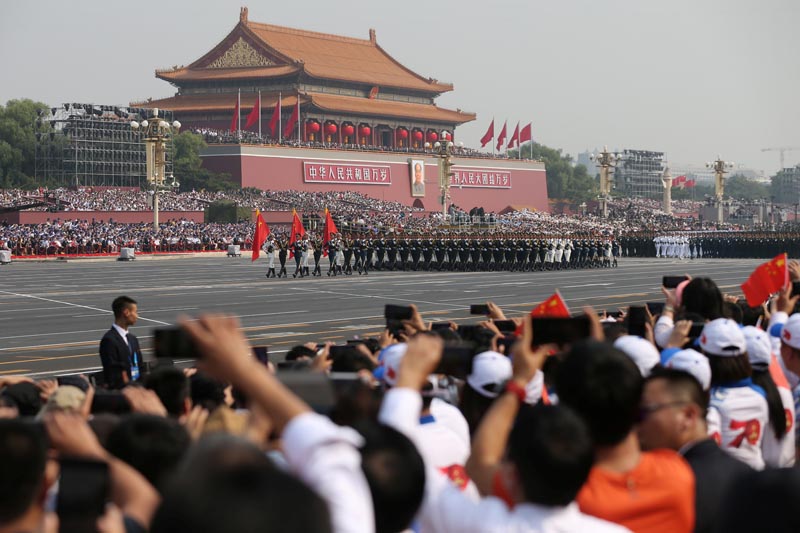China marks 70 years of Communist rule with massive show of force
- President Xi Jinping oversees celebrations, military parade
- Xi pledges China to remain on the path of peaceful development
- China highlights military and technological prowess
- Celebrations come amid challenges of trade war, Hong Kong unrest
BEIJING: China celebrated its growing power and confidence with a massive display of military hardware and goose-stepping troops in Beijing on Tuesday, overseen by President Xi Jinping who pledged peaceful development on the 70th birthday of Communist China.
The event is the country's most important of the year as China looks to project its assurance in the face of mounting challenges, including nearly four months of anti-government protests in Hong Kong and an economy-sapping trade war with the United States.
Xi, dressed in a slate grey "Mao" suit and accompanied by his predecessors Hu Jintao and Jiang Zemin, said China will pursue a mutually beneficial strategy of opening up.
The country's military should resolutely safeguard China's sovereignty, security, and development interests, and firmly uphold world peace, Xi told a handpicked crowd at Tiananmen Square, in comments carried live on state television.
"No force can ever shake the status of China, or stop the Chinese people and nation from marching forward," Xi said from the Gate of Heavenly Peace, where Mao Zedong proclaimed the founding of the People's Republic of China on this day in 1949.
China must maintain lasting prosperity and stability in Hong Kong and Macao, promote the peaceful development of relations with self-ruled Taiwan and "continue to strive for the motherland's complete reunification", he added.
Xi, whose military modernisation programme has rattled nerves around the region, then descended to the street and inspected row upon row of military hardware and immaculately presented troops.
Riding past in a black limousine, Xi bellowed; "Hello comrades, hard-working comrades!"
The massed ranks of soldiers shouted back: "Follow the Party! Fight to win! Forge exemplary conduct!"
Returning to the stage, Xi reviewed groups of servicemen and women marching past and lines of tanks, drones and missiles.
Among the weapons on display were DF-41 intercontinental ballistic missiles, the backbone of China's nuclear deterrence capability, which can carry several nuclear warheads and reach as far as the United States.
CAPITAL LOCKED DOWN
Xi remains broadly popular in China for his aggressive campaign against corruption and for propelling what is now the world's second-biggest economy to the forefront of global politics.
But the Communist Party remains nervous about its grip on power and international standing.
The capital has been locked down for the parade. Police have told residents whose houses look onto the parade route not to look out their windows.
There will be a civilian parade too, of students, model workers, ethnic minorities and even a few foreigners, walking alongside or travelling in floats celebrating China's achievements, officials said last week.
Once the show is over, 70,000 doves will be released to symbolise peace, according to state media.
In the evening, fireworks will light up Beijing.
Xi faces mounting challenges, notably in Hong Kong, where more large-scale protests are expected on Tuesday. Police there have warned of "very serious violent attack".
Hong Kong went into lockdown on Tuesday with barricades in the city centre, shuttered stores and a heavy riot police presence. Embattled Hong Kong leader Carrie Lam is in Beijing for the anniversary celebrations.
Another challenge is Chinese-claimed Taiwan, a free-wheeling democracy with little interest in being run by Beijing and which holds presidential elections in January.
There are also restive minorities in Tibet and heavily Muslim Xinjiang, where China has faced international opprobrium for detaining up to one million ethnic Uighurs in what China calls a de-radicalisation scheme.
Underscoring another problem Xi faces, the parade took place under a smoggy Beijing sky, despite region-wide efforts to curb emissions ahead of the anniversary. Industrial and transportation air pollution has been slow to disperse due to low pressure and high levels of humidity.
Ordinary Chinese residents were not permitted to attend the parade, which was limited to a carefully vetted crowd.
On the eastern end of the main road leading into central Beijing, several kilometres (miles) from Tiananmen Square, crowds gathered craning their necks to see anything.
A road sweeper urged a bystander to go home and watch the parade on television.
"You can't walk to Tiananmen Square. You can't go further than here," he said.






